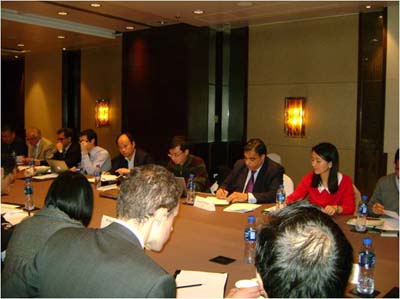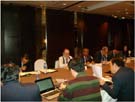A trilateral conference ‘China, India, the UK and Afghanistan- A Partnership for Stability’ was held in Beijing from 24 to 26 November 2014 under the auspices of VIF, Royal United Services Institute of UK (RUSI) and China Institute for Contemporary International Relations (CICIR). A four member VIF delegation led by Gen. NC Vij took part in the deliberations that were in continuation of a series of discussions held on the same subject between the three think tanks with the objective of exploring ways to bring peace and prosperity to Afghanistan through cooperative efforts between China, India and the UK. Participants from Afghanistan and Pakistan were also invited to broaden the discussions as also to elicit their views.
Broadly, the sessions of the conference were divided into political, security and economic issues, interests of the regional powers and mechanisms for cooperation and future of Afghanistan. A visit to the Ministry of Foreign Affairs of China was also organized where officials concerned briefed the visitors on China’s efforts in restoring peace and stability in Afghanistan. On the final day, an interaction with representatives of international media was also organized to spread the message of cooperative efforts being made to improve the situation in Afghanistan.
 Introductory remarks were made by Gen. NC Vij, Director VIF, Mr. Raffaello Pantucci, Director, International Security Studies, RUSI and Dr. Hu Shisheng, Director, Institute for South Asian Studies, CICIR. They reviewed the progress of the trilateral project and gave out their very broad perspectives on the emerging situation in Afghanistan after the installation of the new political dispensation of President Ashraf Ghani and CEO Abdullah Abdullah.
Introductory remarks were made by Gen. NC Vij, Director VIF, Mr. Raffaello Pantucci, Director, International Security Studies, RUSI and Dr. Hu Shisheng, Director, Institute for South Asian Studies, CICIR. They reviewed the progress of the trilateral project and gave out their very broad perspectives on the emerging situation in Afghanistan after the installation of the new political dispensation of President Ashraf Ghani and CEO Abdullah Abdullah.
The first session was devoted to security issues. Lt. Gen. Ravi Sawhney stressed on the nature of threat to Afghanistan which was amply highlighted in the Pentagon Report of October 2014. Threat emanating from safe havens across the Durand Line was an existential threat to the Afghan State and the present regime appeared to be speaking in two different voices indicating some differences between the two factions of the new Government of national unity. Inclusive decision making was lacking and there was a need to bring everybody together. Gen Sawhney brought out that Afghan National Security Forces (ANSF) were performing very bravely despite the many deficiencies they have in terms of lack of logistics capabilities, armor, artillery and other supporting elements. Even though ANA is incurring large number of causalities, it is still finding fresh recruits. Lack of air support and Intelligence, Surveillance and Reconnaissance (ISR) cover especially after it is withdrawn towards the end of 2015 would be a big blow to the ANSF capabilities. There is a continued requirement of training of ANSF at all levels. Though Pakistan has offered to train a brigade worth of ANA, yet it will depend upon whether the same is acceptable to Afghans. Funding the ANSF was another important issue; if the funds dry up after a time, the ANSF would be more like a mob. Dr. Hu Shisheng largely echoed the same problems in so far as capabilities of ANSF were concerned. He also stressed that Pakistan’s stance on Afghanistan would have impact on the emerging situation. He was critical of America’s new anti-terror strategy and implored the international community to make further commitment of funds. Dr. Amrullah Saleh, formerly the head of National Directorate of Security under Karzai government made a very insightful presentation on the security situation in Afghanistan. He said that bulk of operations were being conducted by ANA, the Bilateral Strategic Agreement with the US has been approved by both Upper and the Lower Houses with Loya Jirga supporting it in 2013. However, the core of threat has not gone away. He also stressed that it is a wrong notion that only Pakistan can facilitate the process of reconciliation. It was unprecedented that President Ashraf Ghani went to Pakistan and met their Army Chief in GHQ and not PM Nawaz Sharif. The latest outreach by Afghanistan, in his view, had not given any substantial return from Pakistan. He also placed a lot of hope on China for providing aid and developmental assistance to Afghanistan especially after the recent visit of Ashraf Ghani to Beijing.
The second session was devoted to Afghan economy and prosperity and focussed on what India and China could do to develop the country’s economy. Prof. Ye Hailin, Dr. Qu Fengjie, National Development and Reform Commission gave out the Chinese perspective while Raffaello Pantuci analysed the Chinese efforts in the shape of ‘One Road, One Economic Belt’ and how they might be of benefit to Afghanistan. The question of security first and development later was uppermost in the minds of entrepreneurs while investing in Afghanistan. The next session also looked at economy related issues and especially addressed the aspects of conflict sensitive investment in Central Asia and Afghanistan.
While Amb. TCA Rangachari, Dr. Jenny Jiang , Vice President of New century Academy on Transnational Corporations, China Association of international Trade and Economic Cooperation and Amb. Baheen Sultan Ahmed Afghanistan presented their respective views, no clear and sustainable answers could be found to the complicated issue of conflict sensitive investments even though some ad hoc measures had been undertaken to address this issue. The next session moderated by Dr. Jenny Jiang with a number of representatives from Chinese State Owned Enterprises explained their difficulties about investment in Afghanistan. Brig Vinod Anand discussed India’s approach to encouraging investments in diverse sectors of Afghanistan’s economy and possibilities of cooperation with China in this regard.
 The first session on the second day was devoted to how China, India and Pakistan might cooperate in Afghanistan especially through regional mechanism like SCO or any such other mechanism. Dr Wang Xu dwelt on lack of trust between the regional countries that might prevent some accommodation on each others’ interests. There was a need for CBMs; whether SCO and Heart of Asia process can result in a successful outcome is difficult to say but China would support all such efforts. Dr. Vishal Chandra, IDSA spoke about hope and despair and the need for international community to give a long term commitment to Afghanistan. The following session concentrated on the future of Afghanistan where Lt. Gen Ravi Sawhney again stressed on funding issues for ANSF and budgetary support to the government, containing sanctuaries across the Durand Line and continued engagement by the international community in the absence of which an Iraq like situation might emerge. Lastly, the delegates to the conference were taken to MOFA where n official from the office of Special Representative on Afghanistan explained China’s Afghanistan Policy. He explained how Afghanistan might be included in Silk Road Economic Belt initiative of China. He mentioned about the recent success of the Heart of Asia Conference held in Beijing and how China was extending economic and security aid to Afghanistan. China’s proposal of reinvigorating the reconciliation process under regional arrangements could not get consensus because of objection from some other countries. The delegates raised many questions about the likelihood of success of such a process and why should Taliban be given legitimacy with the start of such a process.
The first session on the second day was devoted to how China, India and Pakistan might cooperate in Afghanistan especially through regional mechanism like SCO or any such other mechanism. Dr Wang Xu dwelt on lack of trust between the regional countries that might prevent some accommodation on each others’ interests. There was a need for CBMs; whether SCO and Heart of Asia process can result in a successful outcome is difficult to say but China would support all such efforts. Dr. Vishal Chandra, IDSA spoke about hope and despair and the need for international community to give a long term commitment to Afghanistan. The following session concentrated on the future of Afghanistan where Lt. Gen Ravi Sawhney again stressed on funding issues for ANSF and budgetary support to the government, containing sanctuaries across the Durand Line and continued engagement by the international community in the absence of which an Iraq like situation might emerge. Lastly, the delegates to the conference were taken to MOFA where n official from the office of Special Representative on Afghanistan explained China’s Afghanistan Policy. He explained how Afghanistan might be included in Silk Road Economic Belt initiative of China. He mentioned about the recent success of the Heart of Asia Conference held in Beijing and how China was extending economic and security aid to Afghanistan. China’s proposal of reinvigorating the reconciliation process under regional arrangements could not get consensus because of objection from some other countries. The delegates raised many questions about the likelihood of success of such a process and why should Taliban be given legitimacy with the start of such a process.
The last half day was devoted to interaction with international media where the participants answered a number of insightful questions on the roles of their respective countries in Afghanistan and joint efforts being suggested to encourage cooperation at both bilateral and multilateral levels.



